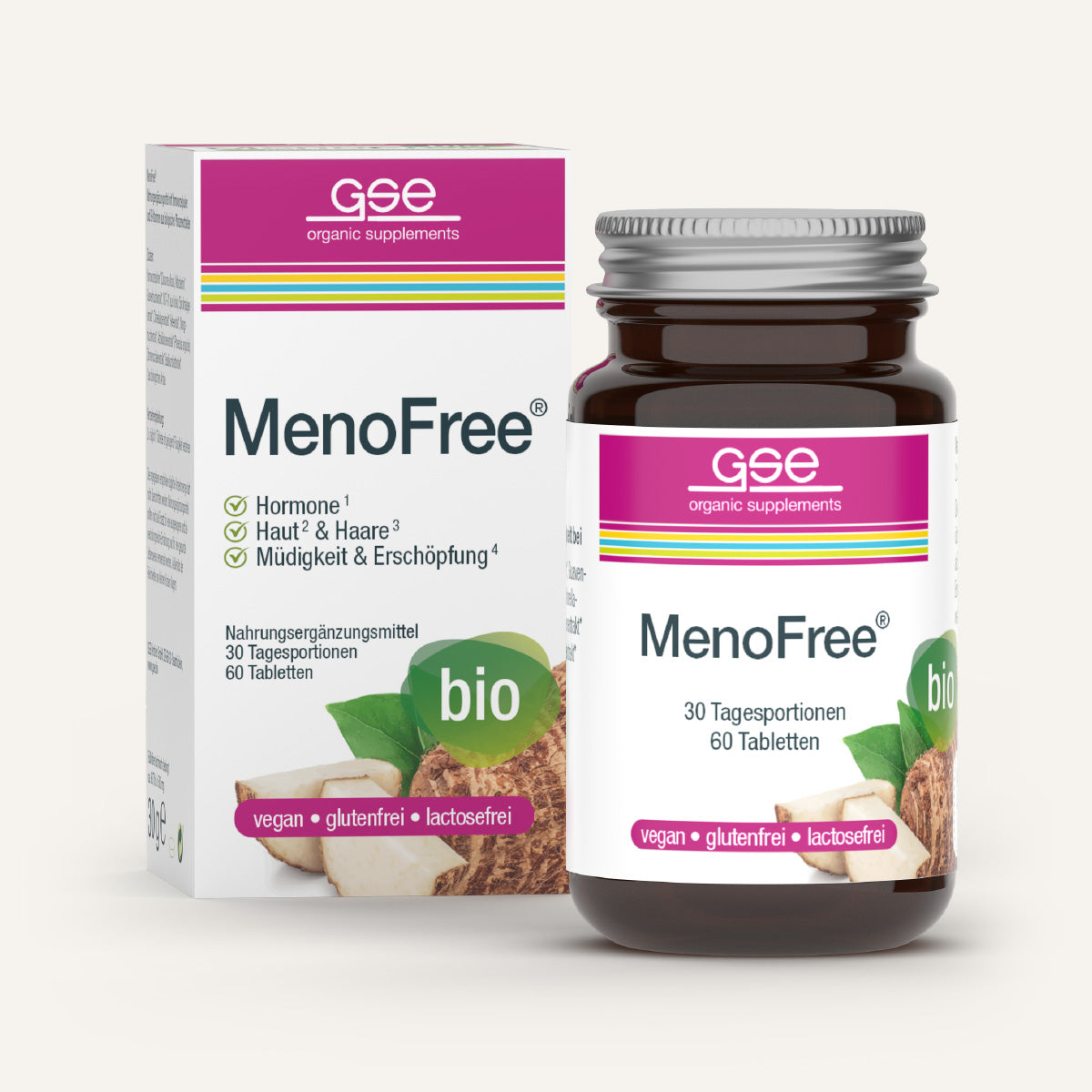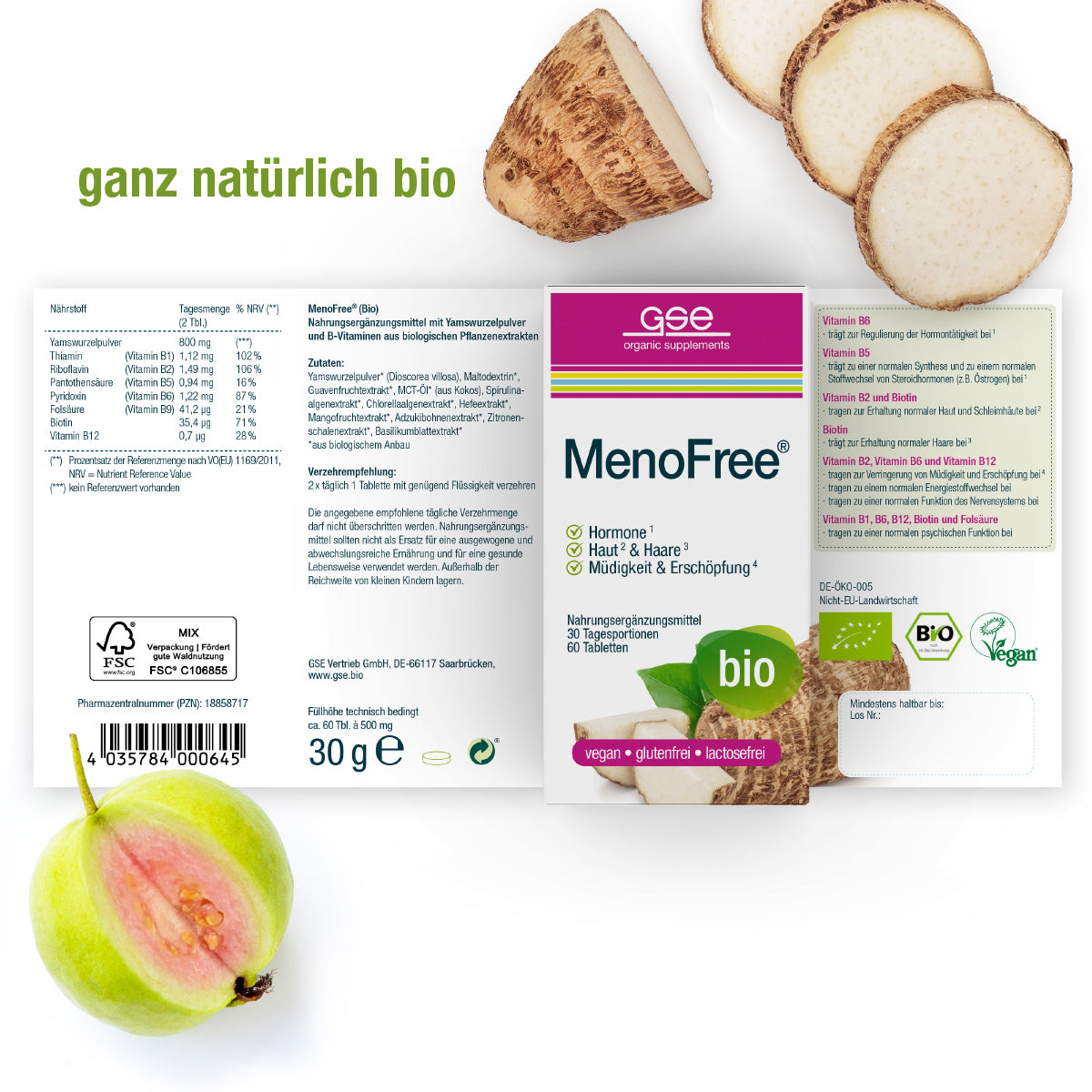
MenoFree®: Natürlich harmonisch durch die Wechseljahre
Nahrungsergänzungsmittel mit Yamswurzel und B-Vitaminen aus biologischen Pflanzenextrakten
Menopause – Zeit des Wandels
Als Menopause bezeichnet man die allerletzte Monatsblutung im Leben einer Frau. Der Fachbegriff für die Phase vor und nach diesem Meilenstein (also die eigentlichen Wechseljahre) heißt eigentlich Klimakterium. Trotzdem hat sich „Menopause“ als Synonym für die Wechseljahre eingebürgert. Vielleicht weil es netter klingt? In jedem Fall läutet die Menopause für Frauen einen neuen Lebensabschnitt ein. Wenn die fruchtbare Phase langsam zu Ende geht, verändert sich nicht nur der weibliche Körper; auch das persönliche Empfinden ist im Wandel. Meist um das 45. Lebensjahr herum beginnt sich der Hormonhaushalt unaufhaltsam zu verändern. Ab der so genannten Prä- bis in die Perimenopause hinein produzieren die Eierstöcke immer weniger Geschlechtshormone, die Periode wird unregelmäßig und hört schließlich ganz auf.
Die Wechseljahre nehmen ihren Namen wörtlich
So unterschiedlich der Hormonhaushalt von Frauen in der ersten Lebenshälfte ist, so individuell präsentieren sich auch die Wechseljahre. Manche Frauen spüren den Abfall des Östrogenspiegels und damit verbundene Veränderungen deutlich, manche bemerken ihn kaum. Ein achtsamer Lebensstil mit bewusster Ernährung, ausreichend Bewegung und gutem Stressmanagement kann sich in dieser herausfordernden Zeit positiv auf das körperliche und psychische Wohlbefinden auswirken. Hier gezielte Anpassungen vorzunehmen, lohnt sich in jedem Fall!
In der Ernährung sind vor allem die B-Vitamine wichtig, und auch manche Stoffe aus dem Pflanzenreich bieten sich als Unterstützung an. Spiegelt der tägliche Speiseplan den erhöhten Bedarf an essenziellen Nährstoffen nicht wider, kann ein gutes Nahrungsergänzungsmittel sinnvoll sein. So trägt z.B. Vitamin B6 zur Regulierung einer normalen Hormontätigkeit bei, während Vitamin B5 die Synthese und den Stoffwechsel von Steroidhormonen (z.B. Östrogen) unterstützt. Die Vitamine B1, B6, B12, Biotin und Folsäure kommen einer normalen psychischen Funktion, Vitamin B5 und B6 einer normalen geistigen Leistung bzw. Funktion des Nervensystems zugute. Vitamin B5 und B6 können dabei helfen, Müdigkeit und Ermüdung zu verringern. Vitamin B2 und Biotin sind darüber hinaus für ihren Beitrag zur Erhaltung normaler Haut und Schleimhäute, Biotin als „Haar-Vitamin“ bekannt.
Pflanzliche Freiheit mit Yamswurzel und B-Vitaminen
MenoFree® ist ein rein pflanzliches Nahrungsergänzungsmittel für Frauen in den Wechseljahren. Es kombiniert ein Pulver aus der Yamswurzel Dioscorea villosa mit natürlichen B-Vitaminen aus Guavenfrüchten, Spirulina- und Chlorella-Algen, Hefeextrakt, Mangofrüchten, Adzukibohnen, Zitronenschalen und Basilikum. Auf synthetische Zusätze verzichtet es bewusst. Alle für MenoFree® verwendeten Pflanzen und Früchte stammen aus streng kontrolliertem biologischem Anbau. Das Produkt ist glutenfrei, laktosefrei und vegan. Durch die hochwertige Braunglasverpackung werden die wertvollen Inhaltsstoffe optimal geschützt.

-
- Vitamin B6 trägt zur Regulierung der Hormontätigkeit bei
- Vitamin B5 unterstützt die Synthese und den Stoffwechsel von Steroidhormonen (z.B. Östrogen)
-
- Vitamin B2 und Biotin tragen zur Erhaltung normaler Haut und Schleimhäute bei
-
- Biotin trägt zum Erhalt normaler Haare bei
-
- Vitamin B2, B6 und B12 tragen zu einem normalen Energiestoffwechsel sowie zur Verringerung von Müdigkeit und Ermüdung bei
-
- Vitamin B1, B6, B12, Biotin und Folsäure tragen zu einer normalen psychischen Funktion bei
- Vitamin B5 trägt zu einer normalen geistigen Leistung bei Vitamin B6 und B12 tragen zu einer normalen Funktion des Nervensystems bei
EFSA* Health Claims für die in MenoFree® enthaltenen Nährstoffe:
- Vitamin B6 trägt zur Regulierung der Hormontätigkeit bei
- Vitamin B5 trägt zu einer normalen Synthese und einem normalen Stoffwechsel von Steroidhormonen (z.B. Östrogen), zur Verringerung von Müdigkeit und Ermüdung, einem normalen Energiestoffwechsel und einer normalen geistigen Leistung bei
- Vitamin B2 und Biotin tragen zur Erhaltung normaler Haut und Schleimhäute bei
- Biotin trägt zur Erhaltung normaler Haare bei
- Vitamin B2, B6 und B12 tragen zur Verringerung von Müdigkeit und Ermüdung, einem normalen Energiestoffwechsel und einer normalen Funktion des Nervensystems bei
- Vitamin B1, B6, B12, Biotin und Folsäure tragen zu einer normalen psychischen Funktion bei
*EFSA = Europäische Behörde für Nahrungsmittelsicherheit

Wechseljahre, Klimakterium, Prämenopause, Perimenopause, Menopause, Postmenopause: Wann ist was?
-
Der Begriff Wechseljahre meint die gesamte Zeitspanne, in der sich der Hormonhaushalt einer Frau von „fruchtbar“ auf „nicht mehr fruchtbar“ einstellt. Der Fachbegriff für die Wechseljahre heißt Klimakterium. Oft wird fälschlicherweise stattdessen „Menopause“ als Synonym benutzt, die jedoch korrekterweise einen ganz anderen Meilenstein bezeichnet (siehe Menopause).
-
Erste Veränderungen des Hormonhaushalts, meist um das 40. Lebensjahr herum. Die Produktion der Geschlechtshormone Östrogen und Progesteron läuft etwas langsamer ab, während gleichzeitig mehr follikelstimulierendes Hormon (FSH) gebildet wird. Manchmal wird der Zyklus jetzt unregelmäßig oder es machen sich erste PMS-ähnliche Symptome wie z.B. Reizbarkeit oder Wassereinlagerungen bemerkbar. Stellen die Eierstöcke bereits in dieser Phase oder sogar früher ihre Arbeit ein, nennt man das vorzeitige Wechseljahre bzw. Klimakterium praecox.
-
An die Prämenopause schließt, überwiegend zwischen dem 45. und 55. Lebensjahr, direkt die sog. Perimenopause an. Es werden immer weniger Eizellen, Östrogen und Progesteron produziert, was das Hormonsystem ganz schön durcheinanderbringen kann. Die Zyklen können deshalb entweder länger oder kürzer und die Blutungen sowohl schwächer als auch stärker sein. Bei manchen Frauen kommen außerdem typische Wechseljahresbeschwerden wie Hitzewallungen, Schlafstörungen, depressive Verstimmung oder nachlassende Libido dazu.
-
Nur die tatsächlich letzte Menstruationsblutung im Leben einer Frau nennt man korrekterweise Menopause. Durchschnittlich ist dies um das 52. Lebensjahr herum der Fall. Eisprünge hat die Frau nun nicht mehr und eine Empfängnis kann mit sehr hoher Wahrscheinlichkeit nicht mehr stattfinden. Das follikelstimulierende Hormon (FSH) wird jedoch weiterhin produziert.
-
Ist die allerletzte Periodenblutung einer Frau mehr als ein Jahr her, beginnt die sog. Postmenopause. Blutungen gehören der Vergangenheit an. Mit etwas Glück gehen Wechseljahresbeschwerden zurück; es kann jedoch auch sein, dass weitere Unannehmlichkeiten wie z. B. trockene Haut und Schleimhäute, Gelenkschmerzen oder gesteigerter Haarwuchs im Gesicht dazukommen. Es ist wichtig, in dieser Zeit sehr gut auf die Ernährung der Knochen zu achten, da sie durch das fehlende Östrogen brüchiger werden und das Osteoporoserisiko steigt. Nahrungsergänzungsmittel mit Calcium, Vitamin D3, Vitamin K, Magnesium und Jod können dazu einen wichtigen Beitrag leisten. Erst wenn der hormonelle „Umbau“ mit ca. 60–65 Jahren vollständig abgeschlossen ist, sind die Wechseljahre vorbei und das sog. Senium (höhere Alter) beginnt.


















